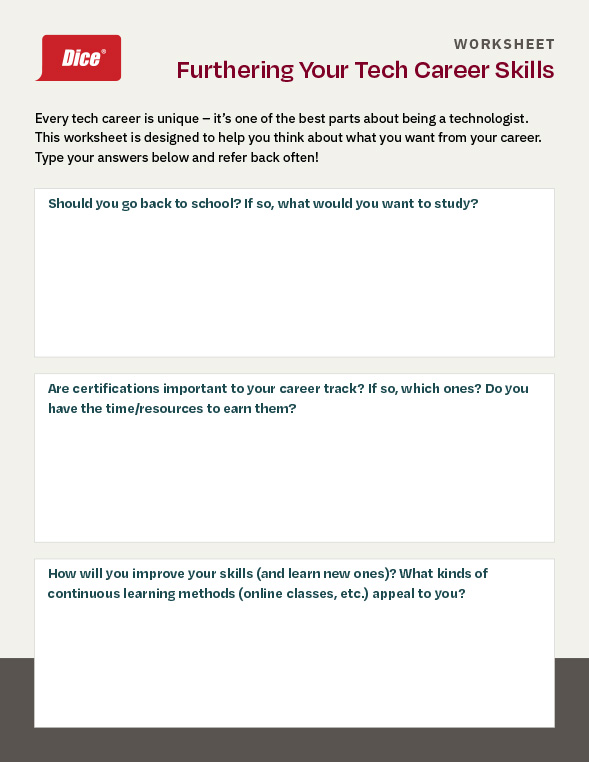Year Three
Settling into your career
By the time you’ve reached the third year of your career, you’ve hopefully settled in a bit. You have a better idea of your strengths and things you can work on. You may have your eye on a particular career track, such as data science or AI. At this point, there are a few things that are important to consider: Keep focusing on professional growth and leadership skills, and keep your resume and portfolio up to date.
WORKSHEET
Furthering Your Tech Career Skills
Download and use this worksheet as you navigate Year Three to jot notes and answer questions that will help you make decisions about your own career.
Keep Focusing on Growth
It’s easy to settle into a particular job and stick with the same technologies. However, the tech industry is always evolving. While many things stay the same (programming languages such as JavaScript and Python have been around for decades, and are more popular than ever), technology subindustries change rapidly; a great example here is how mobile apps exploded from nothing to everything between 2006 and 2009. You need to evolve, too. But how?

Build a network of mentors
One good way to avoid stagnation is to consult with other tech professionals about your career. If you haven’t yet begun to search in earnest for mentors, now’s a really good time. Mentors can suggest future career tracks and give you an idea of pitfalls you might not have the experience to see yet. Plus, the best mentors think of you when they see new opportunities come around, whether in their organization or their network, and these types of referrals can be a very effective way to land jobs you might not have been able to access otherwise.
In order for a mentorship to succeed, it’s important to establish from the outset what both the mentor and mentee want from the relationship. Enter into things gradually; you want to develop a genuine rapport before you begin to lean too heavily on someone for advice and help. The strength of the connection is everything. If you’ve given it time and it’s not working, don’t feel bad about cordially moving away from the relationship, as that’s often better for both parties.

Invest in your skills
It’s never a bad time to ask your employer if they’re willing to invest in your education and training. Whether it’s a series of courses to learn a new technology or a set of certifications relevant to your role, chances are good your employer will be only too happy to foot the bill. While fitting this kind of learning into your schedule might prove difficult and exhausting, it will pay off in the long term by keeping you relevant within the context of your industry.
In 2022, some 72 percent of tech professionals cited training as an important company-sponsored benefit, but only 46 percent received it; with that kind of gap, many tech professionals are likely looking beyond their current company for a future employer who will support their professional development.

Take another look at certifications
At the very beginning of your career, you probably didn’t have enough technical know-how or experience to seriously consider most certifications. Once you’ve been in the industry for a few years, though, it’s time to start thinking about them in a serious way...and working toward them. Popular certifications such as PMP require you to spend several months (and sometimes even a few years) working within a particular discipline.
Finding Fulfillment
Kathryn Minshew, CEO and founder of The Muse, discusses how to find purpose as you advance in your career.
The Value of Leadership Skills
Whether or not you’re thinking of a management track for your career, chances are good that if you excel in your early roles, you’ll be considered for additional management responsibilities after a few years in the tech industry. Management can take many forms; you might be asked to temporarily guide a small team if your boss is out on leave, for example, or you might have to direct contractors or freelancers who are performing some temporary work for your organization.
Keep in mind that, while all managers are expected to be leaders, not all leaders are managers. Many tech companies expect their senior technology professionals to act as leaders within the organization, regardless of their formal title. Even if you have no intention of leading a large team as a project manager or executive, it’s never a bad time to build up your leadership skills, as you’ll inevitably need them during your career. Fortunately, there’s no one secret to good leadership; these are skills anyone can learn through application and repetition.
- Active Listening: Carve out time to really listen to the concerns of those reporting to you. People recognize when you’re hearing them, and they’ll feel more positively about you and your suggestions. (Active listening is a vital skill for everyone, not just managers.)
- Become an Expert Communicator: Always try to imagine how team members and other stakeholders will react to what you’re saying. How can you modify your message to appeal to them more directly? How can you articulate your requests in a way that’s easily understood and rooted in research and data? How can you communicate your and your team’s successes in a way that shows the strongest possible impact on the organization?
- Focus on Results: Whether you’re building products for a consumer audience or working to improve an organization’s tech stack, you always have a “customer” of some sort. What results do those customers want? Good management means keeping those front of mind.
- Positivity is Key: As you progress in your career, you’ll find yourself in difficult situations from time to time. A positive mindset really can mean the difference between success and failure.
Keep Your Resume and Portfolio Up to Date
Don’t wait until a new job opportunity pops up to update your resume and supporting materials (such as your website, your digital portfolio and any code repos). Given the sudden appearance and rapid pace of some offers, you might not have time to do a thorough job of updating. Make it a point to review and update your materials once a quarter with new links, projects and whatever else you think might appeal to future employers.
On your travels around the web, you may have seen a growing number of tools that use AI to assist you in writing your resume and cover letter, including Dice’s Autopen cover-letter creator. Although these tools can save you a lot of time, you should never totally trust your application materials to automation (no matter how smart the underlying algorithms); if you use one, take the time to re-read the output carefully, and tweak whatever the software didn’t quite get right.
For example, a cover letter generator might choose to highlight your most recent experience. However, you might be applying for a job where your older skills and accomplishments are more relevant, and you should edit accordingly. AI can streamline your job-hunting efforts, but it still needs a lot of human guidance.


